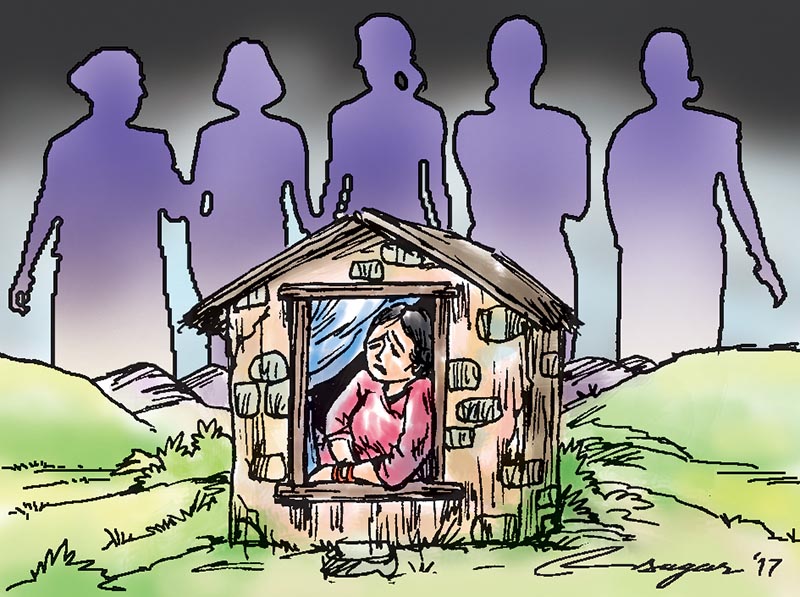15 girls, women died in chhausheds in 13 yrs
Kathmandu, March 23
As many as 15 girls and women died in chhau sheds in the last 13 years in Achham and Dailekh districts alone, according to a recent report made public by National Human Rights Commission.
“Many menstruating girls and women are compelled to lose their lives in chhausheds, but the government and other stakeholders seem least concerned about eliminating this ill practice,” said Mohna Ansari, a member of National Human Rights Commission.
“Chhaupadi was never made a serious national or political issue,” added Ansari.
Many communities in Nepal view menstruating women as impure and in some remote areas they are forced to sleep in a hut away from home during their periods.
Chhaupadi is linked to Hinduism and considers women untouchable when they menstruate, as well as after childbirth.
They are banished from the home — barred from touching food, religious icons, cattle and men — and forced to sleep in basic huts known as chhaugoth.
The practice of staying in sheds away from homes is still prevalent in the hilly districts of Bajura, Doti, Bajahng, Mugu, Kalikot, Baitadi and Dailekh, among other districts in the mid and far-west regions during menstruation and post-natal period.
While unmarried women are required to stay in the shed alone for the first seven days of the menstrual cycle, married women stay for five days.
There is a strongly held belief that if menstruating girls and women are allowed to stay at home, their ‘unclean bodies’ would anger the gods.
The Supreme Court declared chhaupadi an evil ten years ago and subsequently issued a directive to eliminate the practice in 2008.
Despite legal reform, the practice continued unabated. Then in the year 2017, the Parliament passed Criminal Code Bill and criminalised chhaupadi. The new law stipulates a three-month jail sentence or Rs 3,000 fine, or both, for anyone forcing a woman to follow the custom.
But again, the ill practice ofchhaupadi could not be eliminated due to poor enforcement of law. “Law has been made, but implementation is not effective,” said Ansari.
Till date not even a single complaint has been registered with district police offices in Dailekh and Achham. Police officers in the districts said they were not able to take action against anyone as they did not
receive any complaint in this regard.
“While visiting both districts as a member of national inquiry team formed by the national human rights body, police officers arrested the family members for forcing female members to live in chhau sheds during menstruation period, but the court issued an order to release them due to lack of any evidence,” shared Deputy Superintendent of Police DipakPokharel.
“On the one hand, no girl or woman wants to give statement against the family members who force them to live in chhaushed, and on the other hand, in many cases the culprits use political influence to get clean chit from police,” Pokharel added.
The NHRC’s report prepared on the basis of public hearings in Dailekh and Achham has recommended to the central government to implement the law strictly to prevent deaths in chhau sheds and provide sanitary pads in the rural parts of the country free of cost. In the same way, it has also recommended to reduce costums duty on sanitary pads.
Furthermore, the report also recommends that students should be made aware about the ill practice by including lessons on chhaupadi in school curriculum.
Organising different awareness programmes at provincial and local levels, implementation of law and active participation in awareness programmes against chhaupadi are the other recommendations made by the report.






